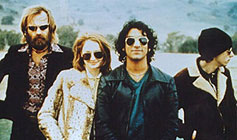|
|
|
|
True Love and Chaos
|
 |
|
True Love and Chaos was, briefly, a strange
cause célèbre within Australian film culture.
Rarely
has there been a local film so completely swamped and obscured by hype both
gushingly positive and absurdly negative. (In retrospect, the film in fact
inaugurated a trend of this sort in regards to much national movie product.) It
was simultaneously raised to heaven and damned to hell; it received almost five
star ratings, or (in one notorious case) a no-star rating.
The
truth of the matter is rather more mundane and middling. True Love and Chaos is just an OK piece of work. It's a rambling
road movie that has big trouble sustaining its mood and its various intrigues,
and wastes its energies on some rather fatuously pitched themes of selfhood,
homecoming and twentysomething-style true-love-conquers-all.
What
pushes the film through is some inventive, controlled direction. This is the
modest fact that has been precisely overlooked in all the extravagant for-or-against
reviews. It's the kind of work that director Stavros Efthymiou proved he could
do in his excellent film school short, Road to Alice (1992) – but which he spectacularly
lost grip of in subsequent films, the scrappy Russian Doll (2001) and the execrable Horseplay (2003). (He also contributed
to the screenplay of Jane
Campion’s In the Cut, 2003.)
What
specifically grabbed my attention in the critical press on True Love and Chaos was the wildly different takes on the
performance of Miranda Otto. To some reviewers she is sublime, subtle,
brilliant, sexy, impressive in every way; to others, she is a right royal pain,
registering as almost unwatchable. Sometimes this is put down to her, sometimes
to the script, or direction, or some other quasi-mystical confluence of
elements.
I'll
confess that her presence in this movie drove me completely barmy, as did Hugo
Weaving's turn as a jaded ‘70s-style rocker massacring a couple of my favourite
Leonard Cohen songs. Unlike in, say, Besson's The Fifth Element (1997), the actors
here have not been blended into a good, coherent
ensemble. That leaves room for every critic or viewer to play their own
favourites-game with the various members of the cast. Of Otto's performance,
what can be said – and I'm making some effort at neutral description here – is
that it is in a little tradition of such roles for her (at least during the
Australian phase of her career, before The
Thin Red Line, 1998, and other overseas roles). Like in Daydream Believer (1992) and especially Love
Serenade (1996), she plays a fidgety, flighty, neurotic type.
I
find Otto’s incarnation of this type an excessive, uncomfortable spectacle,
rarely integrated properly into the film by her directors. I guess the question
really is: does she act this type well, is there some
evidence of her own, personal craft on screen? I'm going to have to take
another look, if I dare, to figure that one out.
In
general, I believe that the critical evaluation of actors and screen acting
presents us with a special, sticky problem. It seems axiomatic to me that there
is no area of cinema more open to purely, intractably subjective evaluation
than an actor's performance on screen. How often does someone say to you, when
pressed, "Look, I just don't like Harvey Keitel/Barbra Streisand/X." That might mean they don't like the way these stars
look, or how they talk or move – just something about their whole physical,
personal aura that is off-putting, induces a bad reaction.
Film
reviewers are not above these kinds of intractable prejudices about actors.
When a critic champions an actor with a particularly fervent intensity,
that may well be a simple confession of their personal lust for the
performer in question. And if you don't believe me on that,
just re-read some of those rapturous descriptions of Miranda Otto in True Love and Chaos by reviewers who
have obviously got stars in their eyes.
© Adrian Martin June 1997 |
![]()